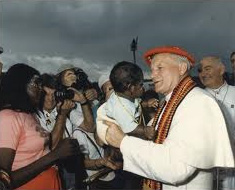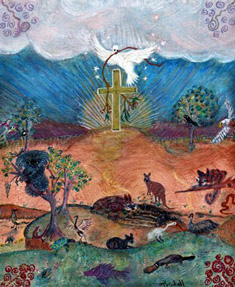201
Pope Francis invited 200 homeless to dinner at the Vatican. The Circle of St. Peter, an organization of the Pope hosted the 200 homeless at the Vatican.“I welcome you in the name of the Pope. As you know, this is your home, and he is pleased that you are here,” Cardinal Bertello explained to the guests.
The dinner was held near the grotto of Our Lady of Lourdes in the Vatican. The Vatican Gendarmes Band performed for the guests as they ate the meal. Chefs from Naples prepared the meals which were served by the families of the Circle of St. Peter.
After the dinner, the guests were given a gift of pastries, fruit, and a rosary.
| IN THE FOOTSTEPS OF THE LORD”: EXHIBITION FOR WORLD YOUTH DAY Vatican City, 10 July 2013 (VIS) - “In the Footsteps of the Lord” is the title of the exhibition which will accompany the 28th World Youth Day in Rio de Janeiro. The exhibition, organised by the John Paul II Youth Foundation of the Pontifical Council for the Laity, will be open from 9 July to 12 October in the Museu Nacional de Belas Artes in the carioca capital. “In the Footsteps of the Lord” presents a series of works, objets d'art and manuscripts grouped into four sections: “Christ, the way of salvation”, “Vocation and mission of the Apostles”; “Mary, the road leading to Christ”, and “The saints: models to emulate”, all inspired by the theme of the World Youth Day, “Go and make disciples of all nations”. “Christ, the way of salvation” includes works on the life of Jesus, the passion and the resurrection, Thomas' disbelief, and the parables of the adulteress and the good Samaritan, as well as an important section dedicated to the image of Christ. The exhibition opens with the celebrated Mandylion of Edessa, venerated as an acheiropoieta or image made not with human hands, regarded as a true image of the Saviour. The exhibition includes other prestigious works by, among others, Beato Angelico, Melozzo da Forli, Leonardo da Vinci, Bernini, Correggio, Guercino and Lorenzo Lotto, whose “Christ and the Adulteress” was recently restored by the Vatican Museums. The Christological image of the Turin Shroud will also be displayed in the form of the photograph taken by Secondo Pia in 1898. The works in the second section are linked to the theme of the call of the Apostles, such as the diptych of St. Peter and St. Paul dating from the third and fourth centuries, on loan from the Vatican Museums, and works by Pomarancio and de Ribera. The section dedicated to “Mary, the road leading to Christ” juxtaposes works from both eastern and western traditions: Byzantine icons are displayed alongside Pinturicchio's celebrated “Madonna of the Window-Sill” and works by Michelangelo, Sassoferrato and Perugino. Finally, the fourth section consists of depictions of the most renowned saints. |
| OTHER PONTIFICAL ACTS Vatican City, 10 July 2013 (VIS) – Today, the Holy Father: - appointed Msgr. Pedro Alberto Bustamante Lopez, of the clergy of Arequipa, Peru, as bishop of the prelature of Sicuani (area 15,800, population 301,000, Catholics 259,000, priests 16, religious 23), Peru. The bishop-elect was born in Cotaparaco, Peru in 1965 and was ordained a priest in 1992. He holds a licentiate in dogmatic theology from the Gregorian Pontifical University in Rome. He has served in pastoral roles in the parishes of Nuestra Senora de la Asuncion, Santa Gertrudis and San Agustin – El Sagragio. He has also served as pro-vicar general, episcopal vicar and vicar general of the archdiocese of Arequipa. He succeeds Bishop Miguel La Fay Bardi, O. Carm., whose resignation from the pastoral care of the same prelature the Holy Father accepted, upon having reached the age limit. - appointed Fr. Andrew Nkea Fuanya, of the clergy of Buea, as coadjutor bishop of Mamfe (area 10,500, population 320,000, Catholics 92,000, priests 39, religious 14), Cameroon. The bishop-elect was born in Widikum, Cameroon in 1965 and was ordained a priest in 1992. He holds a doctorate in canon law from the Pontifical Urban University and has served as member of the commission for the doctrine of the National Episcopal Conference, judicial vicar of the Ecclesiastical Tribunal of the province of Bamenda, secretary general of the Episcopal Conference of the province of Bamenda, president of the Canon Law Assocation in Cameroon, and secretary general of the Catholic University of Cameroon. - appointed Fr. Abdallah Elias Zaidan, M.L., as bishop of Our Lady of Lebanon of Los Angeles (Catholics 24,108, priests 39, permanent deacons 8, religious 15), U.S.A. The bishop-elect was born in Kosaybe, Lebanon in 1963 and ordained a priest in 1986. He has served in a number of pastoral roles, including adjunct rector in the cathedral of Our Lady of Lebanon in Brooklyn, rector of Our Lady of Mount Lebanon – St. Peter in Los Angeles, protopresbyter, member of the Episcopal Council of the south-west and north-west zone of the Maronite Eparchy of Los Angeles, member of the Tele-Lumiere Council of America, coordinator of the Ecclesiastical Tribunal, member of the Sexual Abuse Board, and member of Caritas Liban. He succeeds Bishop Robert Joseph Shaheen, whose resignation from the pastoral care of the same eparchy the Holy Father accepted, in accordance with Canon 210, para. 1 of the Code of Canons of the Eastern Churches. |
3 DAYS OF PRAYER FOR PEACE - BISHOP OF COPTIC ORTHODOX - IN EGYPT
IND. CATH. NEWS REPORT
MIRACLE OF POPE JOHN PAUL II THAT LED TO CANONIZATION FROM COSTA RICA
UCAN NEWS RELEASE
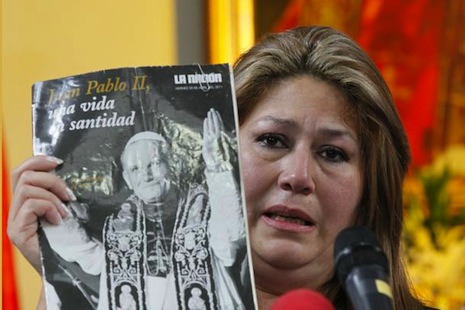
Costa Rican woman weeps as she describes her recovery

Picture: AP
- Javier Cordoba for AP/Boston.com
- Costa Rica
- A Costa Rican woman whose brain aneurysm reportedly disappeared after she prayed to Pope John Paul II broke down in tears Friday as she publicly spoke for the first time about the church-confirmed miracle underlying John Paul’s case for sainthood.
The Roman Catholic Church presented 50-year-old Floribeth Mora and her doctor to reporters after Pope Francis approved the miracle needed to canonize John Paul II.
With tears in her eyes, Mora described how she was sent home with pain medicine but no apparent hope for treatment, thinking she was going to die after her 2011 aneurysm diagnosis.
She says a photograph of the pope seemed to speak to her during the deceased pontiff’s beatification, and her doctor says the aneurysm disappeared for no apparent reason.
Mora and her family kept silent as they awaited the signing of the papal decree recognizing her story as a miracle. On Friday, accompanied by her husband, doctors and Catholic officials, Mora told gathered reporters that she had gone from believing she was about to die to a state of perfect health.
Mora, who owns a private security business with her husband in the middle-class neighborhood of Dulce Nombre de Tres Rios, said she woke up on April 8, 2011, with a strong headache and went to a hospital in the nearby city of Cartago, where she was diagnosed with a severe migraine.
The pain lasted for three days and Mora returned to the hospital, where a series of tests revealed an aneurysm on the right side of her brain that had begun to hemorrhage, according to her attending physician, Alejandro Vargas.
Doctors were unable to stop the bleeding and Vargas consulted colleagues in other Latin American countries and Spain, who advised against operating because of the difficult access to the affected area.
‘‘The risk for Floribeth was death, or ending up with significant neurological damage,’’ Dr. Vargas said Friday.
‘‘I returned home with the horror of imminent death. Seeing my children walking by looking at me, standing beside my bed, seeing my husband making himself strong, taking my hand and crossing himself every night, it was very sad,’’ Mora said.
Her family built an altar to John Paul II outside her house, and while Mora was watching the late pope’s beatification on May 1, 2011, she picked up a magazine and, looking at a photo of the pope, starting to hear a voice.
‘‘It said, ‘Get up, don’t be afraid,'’’ Mora said.
Mora said she stood up and felt instantly better, and a variety of medical exams revealed that her aneurysm had simply disappeared.
Source: Boston.com/AP
SHARED FROM UCAN NEWS
NEARLY $11 MILLION RAISED FOR POOR WITH CARITAS IN AUSTRALIA
Catholic Communications, Sydney Archdiocese RELEASE
10 Jul 2013
10 Jul 2013
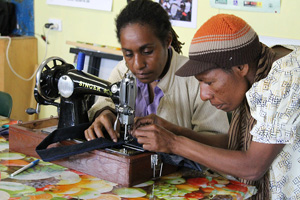
In PNG Project Compassion supports skills and awareness programs
Project Compassion, Caritas Australia's annual fundraiser has broken all records to raise just under $11 million. Last year the Caritas raised $10.7 million but despite a tightening economic climate, Australians dug deep this year to help the world's poorest communities.
With a total just shy of $11 million, Caritas Australia's Head of Community Engagement, Helen Forde says every single dollar will make a difference and help change lives and offer those in poverty-stricken communities the chance of a better life and a better future.
"To raise this amount is an amazing achievement. Every year we are humbled by the continued support of the thousands of every day Australians and are overwhelmed by their generosity," Ms Forde says.
Caritas is the aid and development arm of the Catholic Church and with its Caritas Internationalis partners along with other aid agencies, is not only on hand to help during natural disasters and humanitarian emergencies such as the drought of East Africa last year or the floods that swept through Mozambique earlier this year, but has teams on the ground helping entire communities with education, health, hygiene, sustainable farming and water conservation.
Caritas is the aid and development arm of the Catholic Church and with its Caritas Internationalis partners along with other aid agencies, is not only on hand to help during natural disasters and humanitarian emergencies such as the drought of East Africa last year or the floods that swept through Mozambique earlier this year, but has teams on the ground helping entire communities with education, health, hygiene, sustainable farming and water conservation.

Flooding in Mozambique in January this year displaced 70,000
Ms Forde says it is thanks to the many thousands of supporters in Australia's schools, parishes, towns and cities that Caritas and its partners are able to change lives for the better and help create safe supportive environments for communities in more than 200 countries worldwide.
Project Compassion is a Lenten fundraiser and was launched on Ash Wednesday this year by the Archbishop of Sydney and former chair of Caritas Australia, Cardinal George Pell.
Now in its 49th year, this year's Project Compassion took the theme: "Open doors into the future," from Pope Emeritus, Benedict XVI's 2007 encyclical Spe Salvi.
Specific projects which will be supported by some of the funds raised this year will go towards Early Childhood and Safe Motherhood initiatives in Bangladesh as well as helping the poorest communities of Australia's two nearest neighbours, Papua New Guinea and East Timor.
Caritas Australia has made important inroads in HIV/AIDS programs particularly in PNG and is also helping with the battle against the return of TB which has re-emerged in PNG with deadly consequences.
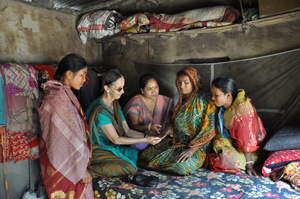
Sr Julienne Hayes-Smith with women in Fulbaria Bangladesh where she helped train midwives and worked closely with Caritas to reduce maternal mortality
While many nations imagine TB is a disease of the past, PNG has experienced a resurgence of the disease and the emergence of a particularly virulent drug-resistant strain.
Some of the other funds raised during this year's Project Compassion will go towards helping victims of the disastrous floods in Mozambique at the beginning of the year as well as towards helping those caught up in ongoing crises in central Africa where millions are battling drought, hunger and conflict.
"Every dollar donated to Project Compassion makes a difference and every person participating in Project Compassion plays an important role," Ms Forde says. "The money raised really does help change lives. It makes a huge difference. Without it we simply could not do the work we do in emergency aid as well as in ongoing programs to help lift people out of poverty and give them a future."
SHARED FROM ARCHDIOCESE OF SYDNEY
TODAY'S MASS ONLINE : WED. JULY 10, 2013
Wednesday of the Fourteenth Week in Ordinary Time
Lectionary: 385
Reading 1 GN 41:55-57; 42:5-7A, 17-24A
When hunger came to be felt throughout the land of Egypt
and the people cried to Pharaoh for bread,
Pharaoh directed all the Egyptians to go to Joseph
and do whatever he told them.
When the famine had spread throughout the land,
Joseph opened all the cities that had grain
and rationed it to the Egyptians,
since the famine had gripped the land of Egypt.
In fact, all the world came to Joseph to obtain rations of grain,
for famine had gripped the whole world.
The sons of Israel were among those
who came to procure rations.
It was Joseph, as governor of the country,
who dispensed the rations to all the people.
When Joseph’s brothers came and knelt down before him
with their faces to the ground,
he recognized them as soon as he saw them.
But Joseph concealed his own identity from them
and spoke sternly to them.
With that, he locked them up in the guardhouse for three days.
On the third day Joseph said to his brothers:
“Do this, and you shall live; for I am a God-fearing man.
If you have been honest,
only one of your brothers need be confined in this prison,
while the rest of you may go
and take home provisions for your starving families.
But you must come back to me with your youngest brother.
Your words will thus be verified, and you will not die.”
To this they agreed.
To one another, however, they said:
“Alas, we are being punished because of our brother.
We saw the anguish of his heart when he pleaded with us,
yet we paid no heed;
that is why this anguish has now come upon us.”
Reuben broke in,
“Did I not tell you not to do wrong to the boy?
But you would not listen!
Now comes the reckoning for his blood.”
The brothers did not know, of course,
that Joseph understood what they said,
since he spoke with them through an interpreter.
But turning away from them, he wept.
and the people cried to Pharaoh for bread,
Pharaoh directed all the Egyptians to go to Joseph
and do whatever he told them.
When the famine had spread throughout the land,
Joseph opened all the cities that had grain
and rationed it to the Egyptians,
since the famine had gripped the land of Egypt.
In fact, all the world came to Joseph to obtain rations of grain,
for famine had gripped the whole world.
The sons of Israel were among those
who came to procure rations.
It was Joseph, as governor of the country,
who dispensed the rations to all the people.
When Joseph’s brothers came and knelt down before him
with their faces to the ground,
he recognized them as soon as he saw them.
But Joseph concealed his own identity from them
and spoke sternly to them.
With that, he locked them up in the guardhouse for three days.
On the third day Joseph said to his brothers:
“Do this, and you shall live; for I am a God-fearing man.
If you have been honest,
only one of your brothers need be confined in this prison,
while the rest of you may go
and take home provisions for your starving families.
But you must come back to me with your youngest brother.
Your words will thus be verified, and you will not die.”
To this they agreed.
To one another, however, they said:
“Alas, we are being punished because of our brother.
We saw the anguish of his heart when he pleaded with us,
yet we paid no heed;
that is why this anguish has now come upon us.”
Reuben broke in,
“Did I not tell you not to do wrong to the boy?
But you would not listen!
Now comes the reckoning for his blood.”
The brothers did not know, of course,
that Joseph understood what they said,
since he spoke with them through an interpreter.
But turning away from them, he wept.
Responsorial Psalm PS 33:2-3, 10-11, 18-19
R. (22) Lord, let your mercy be on us, as we place our trust in you.
Give thanks to the LORD on the harp;
with the ten-stringed lyre chant his praises.
Sing to him a new song;
pluck the strings skillfully, with shouts of gladness.
R. Lord, let your mercy be on us, as we place our trust in you.
The LORD brings to nought the plans of nations;
he foils the designs of peoples.
But the plan of the LORD stands forever;
the design of his heart, through all generations.
R. Lord, let your mercy be on us, as we place our trust in you.
But see, the eyes of the LORD are upon those who fear him,
upon those who hope for his kindness,
To deliver them from death
and preserve them in spite of famine.
R. Lord, let your mercy be on us, as we place our trust in you.
Give thanks to the LORD on the harp;
with the ten-stringed lyre chant his praises.
Sing to him a new song;
pluck the strings skillfully, with shouts of gladness.
R. Lord, let your mercy be on us, as we place our trust in you.
The LORD brings to nought the plans of nations;
he foils the designs of peoples.
But the plan of the LORD stands forever;
the design of his heart, through all generations.
R. Lord, let your mercy be on us, as we place our trust in you.
But see, the eyes of the LORD are upon those who fear him,
upon those who hope for his kindness,
To deliver them from death
and preserve them in spite of famine.
R. Lord, let your mercy be on us, as we place our trust in you.
Gospel MT 10:1-7
Jesus summoned his Twelve disciples
and gave them authority over unclean spirits to drive them out
and to cure every disease and every illness.
The names of the Twelve Apostles are these:
first, Simon called Peter, and his brother Andrew;
James, the son of Zebedee, and his brother John;
Philip and Bartholomew,
Thomas and Matthew the tax collector;
James, the son of Alphaeus, and Thaddeus;
Simon the Cananean, and Judas Iscariot
who betrayed Jesus.
Jesus sent out these Twelve after instructing them thus,
“Do not go into pagan territory or enter a Samaritan town.
Go rather to the lost sheep of the house of Israel.
As you go, make this proclamation: ‘The Kingdom of heaven is at hand.’”
and gave them authority over unclean spirits to drive them out
and to cure every disease and every illness.
The names of the Twelve Apostles are these:
first, Simon called Peter, and his brother Andrew;
James, the son of Zebedee, and his brother John;
Philip and Bartholomew,
Thomas and Matthew the tax collector;
James, the son of Alphaeus, and Thaddeus;
Simon the Cananean, and Judas Iscariot
who betrayed Jesus.
Jesus sent out these Twelve after instructing them thus,
“Do not go into pagan territory or enter a Samaritan town.
Go rather to the lost sheep of the house of Israel.
As you go, make this proclamation: ‘The Kingdom of heaven is at hand.’”
TODAY'S SAINTS: JULY 10 : ST. RUFINA AND ST. SECUNDA
Sts. Rufina and Secunda
MARTYRS
Feast: July 10
Roman martyrs best known for the apocryphal Acts, which recount their martyrdoms. According to the Acta, they were Roman sisters, the daughters of a Roman senator. When their fiances gave up the Christian faith, Rufina and Secunda would not deny Christ. both were soon arrested and beheaded during the persecutions of Emperor Valerian (r. 253-260). They were buried on the Via Aurelia, at the Santa Rufina.
|
source: http://www.ewtn.com/saintsHoly/saints/R/strufina_secunda.asp#ixzz1RhlQu0vx


